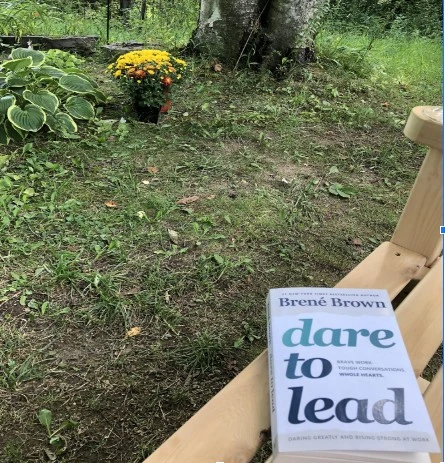“It is not the critic who counts; not the man who points out how the strong man stumbles… The credit belongs to the man who is actually in the arena, whose face is marred by dust and sweat and blood; who strives valiantly; who errs, who comes short again and again, because there is no effort without error and shortcoming… who at the best knows in the end the triumph of high achievement, and who at the worst, if he fails, at least fails while daring greatly, so that his place shall never be with those cold and timid souls who neither know victory nor defeat.”
– Theodore Roosevelt, April 23, 1910
Brené Brown included this quotation early on in her book Dare to Lead. Since reading the book earlier this fall, the quotation has stuck with me. I read the book for two reasons – it is a book we are reading as an administrative team and the book was the backbone of a weekend retreat of female Rowland fellows. Reading the book with two different purposes and groups of people allowed me to melt into the ideas and apply them, reflect, re-read, and try them again.

I find something magical in reading a book with complex ideas with colleagues. It is something that I do not do enough of. Reading and discussing a book with purpose with colleagues – in your school/district or with peers in the same field – brings with it a depth that I find hard to achieve on my own. I also find it a nourishing experience to read a book and talk about things that have happened and how the ideas are now shaping my thinking in a different way.
Two years ago, I was fortunate to be at a school where the staff wanted to read The Body Keeps the Score together. Not everyone read the book, but enough people did read it and voluntarily come to discussions that the ideas about trauma influenced the learning we continued to do as a school, the systems we built to support students, and the culture we built together the following years.
My reading of Dare to Lead with two groups has been equally formative on my practice as a leader. I have read each section of the book at least two times but between the first read and the second, I had a chance to consider how I was practicing the idea that “clear is kind” in my work and how I did – or didn’t – rumble with vulnerability. Then, I was going back to the text and reading it again in the context of my new thinking and learning. It is pretty interesting to me that going back a second time I often focused on new parts of the book. The ideas that most speak to me depend on what I have experienced and the shared learning conversations with colleagues.
The part of the book that has most influenced the way I am thinking about leadership now is around core values. While I read the chapter on core values by myself, it was only through conversation and learning with other Rowland women that I understood how my core value of love exists in my daily practice. After doing this learning with other women, I find myself checking my leadership moves and conversations and choices based on my core values. This conscious leading through love allows me to get out of my inbox and calendar and be much more present with students, colleagues, families – and just as importantly with my own family.
I am grateful for being part of two groups that both chose the same book to read together. To have the chance to consider the idea of leadership as conceived and shaped by a female leaders’ work has been tremendous. To have this opportunity as part of my job and professional network has allowed me to grow in ways I could not have without out focused and purposeful conversations. I wonder how we might create these common reads for more staff and families in our schools. If we had these opportunities, we would build more common understanding, civility, and reflective practices in our whole school community. I suspect they would foster a strong school culture, one of continued learning.
Vermont Many thanks to the Rowland Foundation for supporting the Rowland Women’s Retreat this year as a way to pull together fellows around a common text and experience.
Jen Kravitz 2012 Rowland Fellow. Principal Mary Hogan Elementary School
